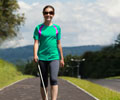Chalking future strategies to deal with blindness and lung damage in premature babies has been made possible by a study of nine British children who trekked towards Everest Base Camp.
The results of the Smiths Medical Young Everest Study may also pave the way for children with chronic lung diseases to be monitored at home rather than in hospital, say the researchers associated with the project.While trekking, the children were breathing far less oxygen than they would at sea level. It was as debilitating as a critical illness, and similar to the conditions experienced by premature babies.
The study’s results showed that the children coped better than would be expected with the low levels of oxygen saturation in the blood.
Doctors generally administer oxygen to premature babies or children with chronic breathing difficulties. But administering too much of oxygen to children may cause damage to their lungs, and it may lead to blindness in premature babies.
Experts believe that the information on the nine children who ascended mountain pathways may help study whether doctors can lower the doses of oxygen administered.
According to them, the study’s results indicate that the human body copes with lower oxygen levels by reverting to techniques used in the womb.
Advertisement
Medical experts, including intensive care doctors and doctors who specialise in foetal growth, will meet next week to discuss whether there is a link between people experiencing high altitudes, foetuses in the womb and diving mammals.
Advertisement
He revealed that, though all the children participants in the study coped well with lower levels of oxygen in their blood, some coped far better than others.
He added that that observation suggested that such children had a genetic predisposition to adapt to low oxygen levels.
According to him, this information might be helpful in developing tailored treatments for children in intensive care.
Janet Stocks, Professor of Respiratory Physiology at University College London, who led the study, said: "The children all kept diaries recording how they were feeling, and this really didn’t reflect how their bodies were coping. I think it’s fairly clear that there is a genetic determinant."
Professor Mythen now plans to take 100 British children to the Himalayas in 2011 for a study.
Source-ANI
RAS/K









